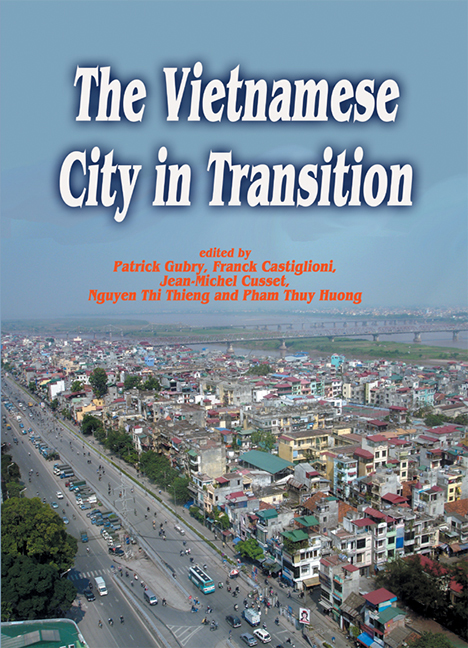Book contents
- Frontmatter
- Contents
- List of Tables
- List of Figures
- List of Colour Plates
- Foreword
- Acknowledgments
- List of Acronyms
- The Editors
- The Contributors
- Introduction: Urban Research in Action: Context, Aims, Directions
- 1 Urban Transition in Vietnam: Its Processes and Stakeholders
- 2 Road System and Urban Recomposition in Hanoi
- 3 Intra-Urban Mobility in Ho Chi Minh City and Hanoi
- 4 Resettlement Issues of Informal Settlement Areas in Ho Chi Minh City: From Large-scale Programmes to Micro-projects
- 5 Changes in Public Water Management: Transition, Compromise, and Innovation
- 6 The Role of Civil Society in Urban Environmental Management
- 7 Assessment of Projects Supported by Official Development Assistance Based on Partnership Formats: From Ho Chi Minh City to Hanoi
- 8 Relations between International Consultants and the Local Engineering Force in Urban Infrastructures
- 9 Conclusion: A Diverse Approach to Research on Urban Issues
- General Bibliography
- Index
- Plate Section
6 - The Role of Civil Society in Urban Environmental Management
Published online by Cambridge University Press: 21 October 2015
- Frontmatter
- Contents
- List of Tables
- List of Figures
- List of Colour Plates
- Foreword
- Acknowledgments
- List of Acronyms
- The Editors
- The Contributors
- Introduction: Urban Research in Action: Context, Aims, Directions
- 1 Urban Transition in Vietnam: Its Processes and Stakeholders
- 2 Road System and Urban Recomposition in Hanoi
- 3 Intra-Urban Mobility in Ho Chi Minh City and Hanoi
- 4 Resettlement Issues of Informal Settlement Areas in Ho Chi Minh City: From Large-scale Programmes to Micro-projects
- 5 Changes in Public Water Management: Transition, Compromise, and Innovation
- 6 The Role of Civil Society in Urban Environmental Management
- 7 Assessment of Projects Supported by Official Development Assistance Based on Partnership Formats: From Ho Chi Minh City to Hanoi
- 8 Relations between International Consultants and the Local Engineering Force in Urban Infrastructures
- 9 Conclusion: A Diverse Approach to Research on Urban Issues
- General Bibliography
- Index
- Plate Section
Summary
All international cooperation agencies promote public participation and assert the need to mobilize civil society in urban environmental management. The World Bank is one of the main promoters of this approach, which it describes as good urban governance (World Bank, 1999).
In fact, they all strictly adhere to the principles put forward by Agenda 21 (1992 Rio Conference). These principles advocate decentralizing environmental management responsibilities in favour of local government, as well as the need for local government to involve the population and to work in partnership with the private sector and with the associative and community sector. The majority of programmes privilege capacity-building and the transfer of real power to such stakeholders. However, such principles assume that civil society is an organized entity comprising stakeholders which are independent from the government and which can act as its potential partners.
The objective of our research has been to study the role of Vietnamese civil society in urban environmental management within the framework of actual environmental projects, so as to assess the connections or lack thereof between Vietnamese society's grassroots organizations (that is, People's Committee, patriotic associations and mass organizations) and what are commonly known as NGOs. Such projects should illustrate three types of civil society mobilization within the framework of urban environmental management practices: environmental planning and management, the provision of urban environmental services and the management of environmental conflicts.
Our overall theoretical construction operates under the concept of governance. Governance describes a general socio-political concept within which relations between governments and civil society take place, with the objective of reinforcing local capacities in order to decentralize administration. Civil society includes the private sector, but in current political strategies, it really mainly consists of grassroots community organizations (GCO).
The second stage consists in recognizing these organizations, developing their capacity and empowering them.
- Type
- Chapter
- Information
- The Vietnamese City in Transition , pp. 167 - 210Publisher: ISEAS–Yusof Ishak InstitutePrint publication year: 2010



